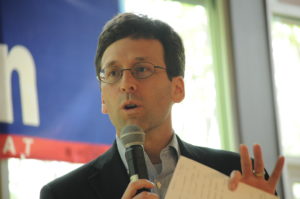Bob Ferguson, Washington state’s attorney general, became famous when he put a stop to President Donald Trump’s immigration ban in early February. He spoke April 7 at the Journalism Education Association convention in Seattle, where he explained the situation that sparked his decision and answered student journalists’ questions.
Trump’s ban had been signed on a Friday night, resulting in immediate actions, such as people from other countries arriving in the U.S. on airplanes, holding visas and being turned away.
Ferguson said he was in Florida at a meeting of all the states’ attorney generals when he learned of the ban. When he landed Saturday, he discovered he had messages of protest from around the country.
Ferguson said he was asked this question: “Was it a hard decision to sue the President?”
He explained that before any decision was made, he asked himself three questions: “(1) Are Washingtonians being harmed? (2) Do we have good legal arguments? And (3) Can I bring the lawsuit on behalf of the people?”

Ferguson realized that the answer to all the questions was “Yes.”
In addition, he believed the ban was illegal for two reasons: (1) because of the First Amendment: “one religion can’t be preferred over another” and (2) “due process – you can’t just take away travel visas or green cards.”
He realized that many polls showed the ban was popular, and he considered the possibility that the President might withhold funds from Washington.
The day after his return to Washington was Super Bowl Sunday, but once the decision was made to stop the ban, Ferguson and his team got to work. “I asked my team to put together in days what would ordinarily take months,” he said.
The team’s goal was to get an injunction to stop the ban before a judge by that Friday. The judge concerned agreed to a hearing on Friday, and motions were filed.
“The national media didn’t appreciate what we were doing,” Ferguson said. Well-known experts, such as Alan Dershowitch and Anderson Cooper kept saying stopping the ban “would never work.”
Ferguson told an interesting story about the way CNN contacted him: it was through his mother. CNN wanted Ferguson to appear on their news story, but they hadn’t been able to get ahold of him, so they somehow found his mother’s number and called her. His mother called him, told him of CNN’s call and he did appear on that news channel.
“Be creative in finding your sources,” Ferguson said with a laugh, encouraging the student journalists to use CNN’s plan if necessary.
“They didn’t see it coming,” Ferguson said, referring to the injunction that stopped the ban. After the injunction, people from the originally banned countries could now come into the U.S.
When the second travel ban came about some time later, “We filed another injunction,” Ferguson said. He added that Trump had tweeted in all capital letters, “SEE YOU IN COURT!” Ferguson’s response: “We’ve seen him in court twice, and we’re two for two!”
“The experience has been positive from my perspective,” Ferguson said. “Iraqis who have worked with our military, children who need surgery, etc. – they could now legally enter the country.”
When Ferguson was asked for his reaction to the U.S. attack on Syria, he explained that that was an international event and he would take no stand on that.
He did mention that he did not sign on when the Democratic attorney generals posted their disfavor of Neil Gorsuch’s nomination as a Supreme Court justice. “I try to focus on the legal aspects of my job,” he said.